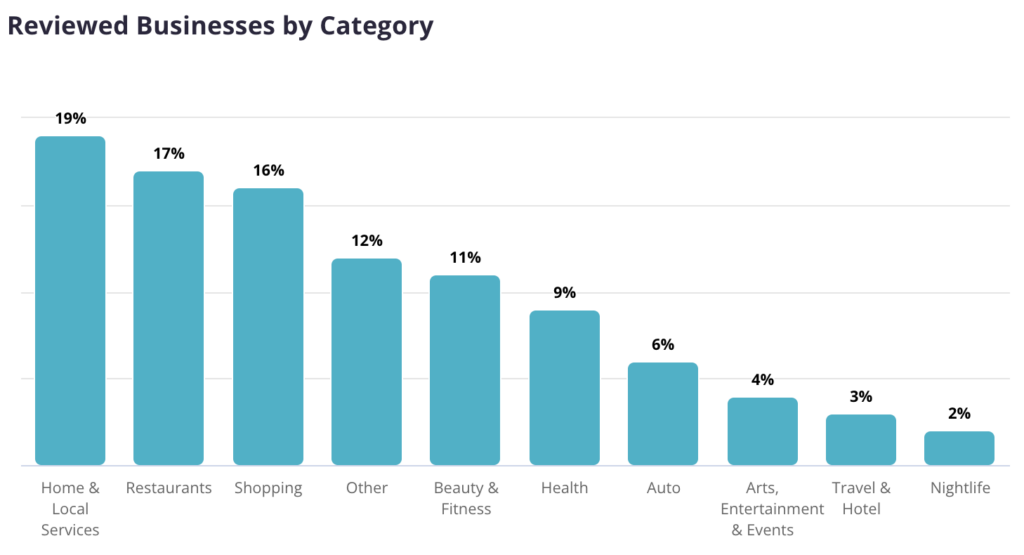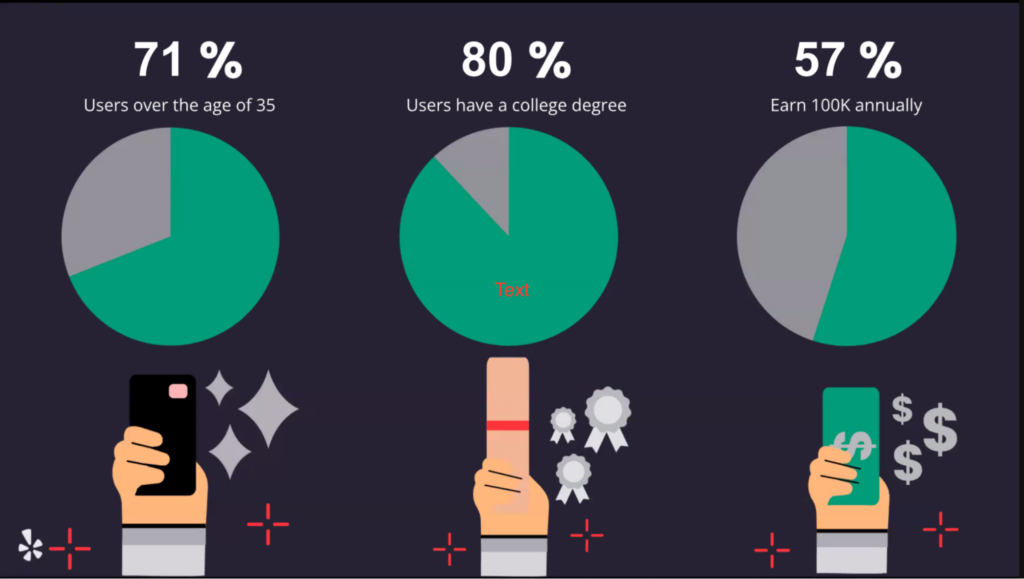I once heard that the best way to incite a rant was to invite a business owner to lunch and casually bring up Yelp.
The international platform that attracts more than 178 million unique visitors each month has created enemies among business owners since its inception in 2004. Back then, it was simply an email recommendation service, but it quickly grew into a local business review site, crowdsourcing information for customers and consumers to share their experiences – largely without the businesses themselves participating.
We understand the frustrations associated with Yelp since it was created for, and therefore most often favors, the consumer more than the business owner. In fact, because our team at WebPunch stands alongside business owners, we shared our own rant about Yelp several years ago. While some things haven’t changed – namely, the annoying Yelp software that deems reviews “not recommended” – the overall consumer review landscape has changed, and Yelp is starting to look better in comparison.
Here are five reasons why Yelp doesn’t suck as bad as it used to.
1. Yelp’s review removal process is more reliable than Google or Facebook.
It happens frequently: a review is posted that is in violation of the website’s content guidelines. When this happens, each website has an option to flag and report these reviews. The problem, particularly with Google and Facebook, is that these requests seem to disappear into the ether. Often, we don’t receive a decision; we learn the review has been removed or the request has been rejected only by continuing to manually check the website.
Google used to have a clear escalation process and a support team you could call – meaning, we could reach out to a person and appeal their decision – but lately, they have bypassed their own system so we no longer have that option. The concept of “Google support” to escalate a review for removal has all but disappeared in the post-pandemic world, and unless their AI software catches an erroneous review before it’s posted, Google is unlikely to remove even prohibited reviews.


In both of the examples above, Google did not allow us to escalate these reviews, nor did they remove them. Although our team can predict which reviews qualify for removal, it’s a roll of the dice whether or not Google will actually take action.
Meanwhile, Facebook lacks an escalation system altogether. There is simply no way, other than having a degree in the Dark Arts, that a person can contact a real, living Facebook employee. Additionally, Facebook’s content guidelines are far less stringent. We struggle with basic necessities, like removing obvious spam messages.

Yelp, on the other hand, offers a glimmer of hope when it comes to review removal. More than 218,600 reported reviews were removed by Yelp’s moderators in 2021, and their process is more reliable. If you read nothing else in this article, please read this: Yelp is currently the only platform where you can still contact a human being. Although Yelp will not engage in factual disputes, they will look at the evidence presented and remove a review if it is a violation of one of these three criteria:
- the reviewer has an apparent conflict of interest (e.g., they’re affiliated with the business or are a competitor)
- the review includes inappropriate material (e.g., threats, lewdness, hate speech, etc.)
- the review doesn’t focus on the reviewer’s own consumer experience (e.g., they heard this story from a friend, or if a review is posted for the wrong location).
The only catch is that the evidence must be demonstrable.
Here’s a real-life example of a Yelp review that was posted on the wrong business page, and we were able to get it removed.
A home inspection company received a 1-star review from a customer who was unhappy about mold they found in their condo post-inspection. Within the review, the customer mentioned:
- their condo’s location (the city) and
- the name of their home inspector
Because they mentioned these details, we were able to submit a removal request to Yelp that demonstrated that the area of the state the customer lives in is covered by a different home inspection company. Each business’s website also included details about its team members. By linking these websites to our report, we demonstrated that there was no inspector at this company by the name mentioned in the review, and that the review was meant for a different location. Yelp employees agreed with our assessment and removed the review.
That still seems like a lot of work, you might be thinking.
Yes, we hear you, and that’s why we at WebPunch are happy to do the heavy lifting and make sure Yelp has all the information they need to make the right decision. The more detail business owners share with us, and the more detail the reviewer writes, the more likely we are to have erroneous reviews removed.
Situations that Yelp will not consider
While Yelp still offers us the best opportunity to have erroneous reviews removed, there are still a few common requests we hear from business owners that Yelp will not consider. We hate it, too, but you can take solace in the fact that Google and Facebook will not consider these reasons either.
- “I don’t recognize this person’s name, so they must not be a client.” (This argument alone will not suffice.)
- “This person ought to prove to Yelp – via receipts, etc. – that they utilized our business.” (Yelp does not require such proof.)
- “The details the person wrote in the review are a lie.” (Yelp will not engage in factual disputes.)
- “This customer signed a document saying they were satisfied, but now they write a review saying they aren’t.” (Yelp will not engage in factual or legal disputes.)
In cases such as these, the best line of defense is a well-crafted response. We know that responding to negative reviews can be challenging, which is why our team of talented writers can help you. (Curious? Find out more.) This gives you more control over the narrative, and since Yelp users are reading reviews more than ever before, responding can always work in your favor.
2. Yelp reviews must contain written content.
Unlike other review platforms, including Google, Yelp requires that ratings be accompanied by review text. Yelp believes “a star rating without review text is less reliable and useful to other consumers.” This is actually a decent safeguard against scammers and extortionists who try to destroy a business’s star rating by flooding them with bad reviews. (And let’s not forget, Google will not remove no-comment reviews because without content, there is no violation of content guidelines.)
Take, for example, an unhappy customer who goes on a rampage. It’s easy for them to create multiple Google profiles and fill a business’s page with an influx of 1-star, no-comment reviews – and get their friends and family to join in. It’s much harder to create multiple Yelp profiles and generate a lot of fake text. Even if they did, reviews from newly created Yelp profiles are more likely to be filtered out by Yelp’s “not recommended” software.
3. The upside to Yelp’s dreaded “not recommended” filter.
In addition to the aforementioned situation, in which haters of your business will be less successful in destroying your reputation by creating fake profiles, the “not recommended” filter has one additional benefit: these reviews are still viewable to the public.
Lately, Google has had an increasing problem with reviews disappearing. These reviews either sit in a type of “Google jail” where they have been posted but are not visible, or they disappear altogether. And so far, we have only heard reports of Google doing this to positive reviews.
Yelp’s “not recommended” AI filter works on both positive and negative reviews. While these reviews are relegated to a separate page, at least they remain visible and people can read them. And the “not recommended” status isn’t permanent: reviews can be moved onto the main page if something in the algorithm changes.
It’s a dim silver lining, but a silver lining nonetheless.
4. “Home and Local Services” are #1.
If you think Yelp reviews are just for restaurants, think again. In the September 2022 fact sheet, Yelp reported that the number one category of businesses that received reviews was “Home and local services,” beating out restaurants.

Beginning in 2016, Yelp started making their platform more user friendly for businesses and even rolled out “Request a Quote” and “Request a Call,” allowing Yelp users to interact directly with businesses and take immediate action with them. This was particularly beneficial for Automotive, Event Planning, Financial Services, Home Services, Local Services, and Professional Services.
In December of 2022, Yelp announced even more new service features that will improve the discovery and hiring experience for both consumers and businesses. They recognize that people are using Yelp for more than just restaurant recommendations and have begun improving their app to benefit business owners and the consumers who request their services.
5. Yelp isn’t just for college hipsters.
Contrary to popular belief, Yelp users are primarily well-educated adults over the age of 35, the majority of whom generate >$100k income per year. Again, here are their September 2022 stats:

So, are you still going to go out to lunch and rant about Yelp? Perhaps. But we hope you see that Yelp isn’t all bad. It’s important to note that even though Google is still the Big Bad Boss of the review world, the more robust your Yelp page is, the better your Google SEO (Search Engine Optimization) will be. Because Yelp is one of the third-party review sites that Google looks to when ranking businesses, your business will rank higher in location-based searches if your Yelp page is strong.
Our suggestion is not to write Yelp off as the enemy, but to get to know it, particularly your Yelp-using customers who write you reviews and reach out to you through Yelp’s new service features. If you have any questions about improving your SEO, responding to reviews, or making sure your online reputation is superb, WebPunch would love to hear from you.

Jenny
Jenny thinks of herself as a Jill of all Trades, with WebPunch's "Renegade Review Responder" being one of her all-time favorite titles. As a former dolphin trainer, military school professor, and alcohol researcher, she now enjoys working from home and writing about her misadventures. She lives with her smokeshow of a husband and loves traveling the world with him. You'll likely find the pair wandering through the horios of Greece.


